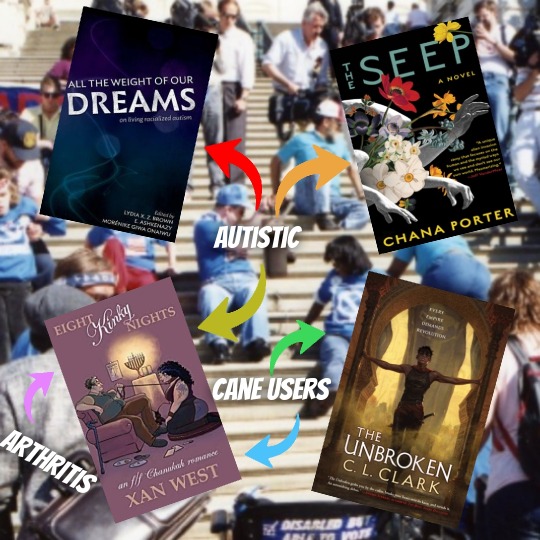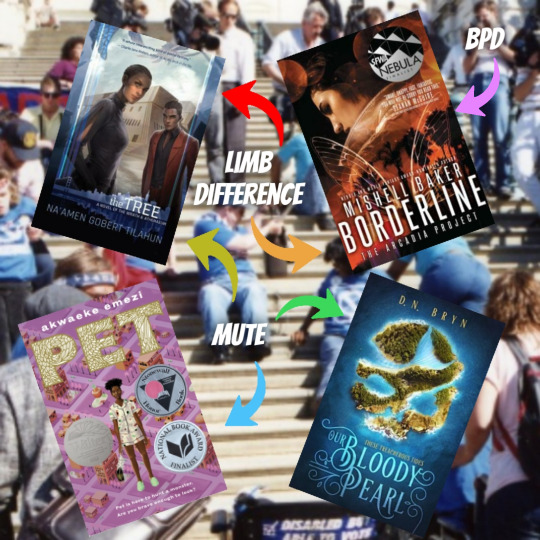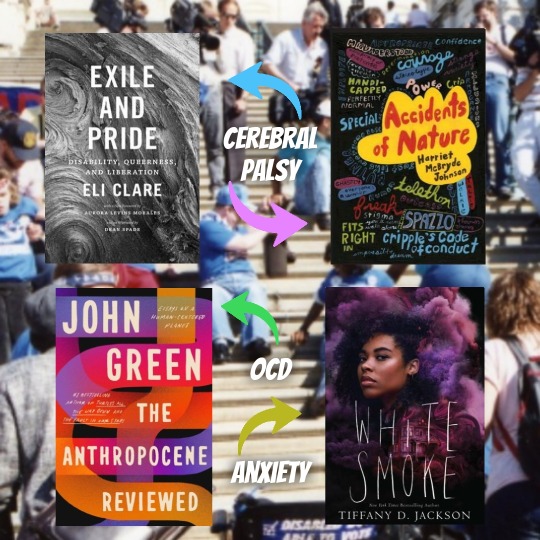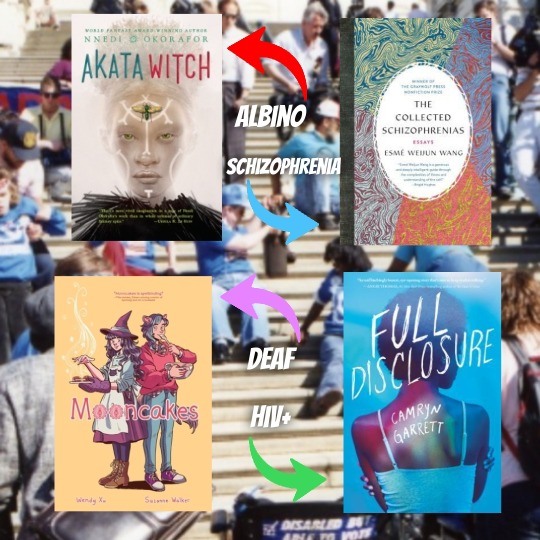#the collected schizophrenias
Text
Some people dislike diagnoses, disagreeably calling them boxes and labels, but I've always found comfort in preexisting conditions; I like to know that I'm not pioneering an inexplicable experience.
— Esmé Weijun Wang, The Collected Schizophrenias
#the collected schizophrenias#esmé weijun wang#essays#schizophrenia#quotes#literary quotes#literature#writing#books#spilled ink#thoughts#lit#pretty quotes#quote of the day#reverie#reverie quotes#quote#book quote#book quotes#inspiring quote#inspiring quotes#mental health#nonfiction
31 notes
·
View notes
Text






Another Instagram crosspost! This time for Disability Pride Month!
Note: The Tree is a sequel, but the MC sustains the injuries that make her disabled in book one
[Image: several graphics edited with a picture of The Capitol Crawl as the background. The first image has text reading "Favorite Disability Books."
The next image shows four books- All the Weight of Our Dreams: On Living with Racialized Autism ed by Lydia XZ Brown, E Ashkenazy, and Morénike Giwa, The Seep by Chana Porter, Eight Kinky Nights by Xan West, and The Unbroken by CL Clark. There is also text with colorful arrows pointing to the books. The label "autistic" points to All the Weight of Our Dreams, The Seep, and Eight Kinky Nights. The label "cane users" points to Eight Kinky Nights and The Unbroken, and the label "arthritis" points to Eight Kinky Nights.
The next image has four books- The Tree by Na'amen Gobert Tilahun, Borderline by Mishell Baker, Pet by Akwaeke Emezi, and Our Bloody Pearl by DN Bryn. This image also contains labels and arrows. "Limb difference" points to The Tree and Borderline. "Mute" points to The Tree, Pet, and Our Bloody Pearl. "BPD" points to Borderline.
The next image has two books. Disability Visibility: First Person Stories from the Twenty-First Century ed by Alice Wong is labeled "collected works." Care Work: Dreaming Disability Justice by Leah Lakshmi Piepzna-Samarasinha is labeled "no focus on a specific disability; about mutual aid."
The next image has four books- Exile and Pride: Disability, Queerness, and Liberation by Eli Clare, Accidents of Nature by Harriet McBryde Johnson, The Anthropocene Reviewed by John Green, and White Smoke by Tiffany D Jackson- and more colorful arrows. "Cerebral palsy" points to both Exile and Pride and Accidents of Nature. "OCD" points to The Anthropocene Reviewed, and "anxiety" points to White Smoke.
The last image features four books, each with one label pointing to it. Akata Witch by Nnedi Okorafor is labeled "albino." The Collected Schizophrenias by Esmé Weijun Wang is labeled "schizophrenia." Mooncakes by Wendy Xu and Suzanne Walker is labeled "Deaf." Full Disclosure by Camryn Garrett is labeled "HIV+" End.]
#bookblr#all the weight of our dreams: on living with racialized autism#the seep#eight kinky nights#wrath & athenaeum trilogy#arcadia project trilogy#the unbroken cl clark#pet akwaeke emezi#our bloody pearl#disability visibility#care work#exile and pride#accidents of nature#the anthropocene reviewed#white smoke#akata witch#the collected schizophrenias#mooncakes#full disclosure
108 notes
·
View notes
Text
"There might be something comforting about the notion that there is, deep down, an impeccable self without disorder, and that if I try hard enough, I can reach that unblemished self.
But there may be no impeccable self to reach, and if I continue to struggle toward one, I might go mad in the pursuit."
- Esmé Weijun Wang, The Collected Schizophrenias
8 notes
·
View notes
Text
“A therapist told me in my midtwenties, when my diagnosis was still bipolar disorder, that I was her only client who could hold down a full-time job. Among psychiatric researchers, having a job is considered one of the major characteristics of being a high-functioning person. Most recently, Saks has spearheaded one of the largest extant studies about the nature of high-functioning schizophrenia. In it, employment remains the primary marker of someone who is high-functioning, as having a job is the most reliable sign that you can pass in the world as normal. Most critically, a capitalist society values productivity in its citizens above all else, and those with severe mental illness are much less likely to be productive in ways considered valuable: by adding to the cycle of production and profit. Our society demands what Chinese poet Chuang Tzu (370–287 BCE) describes in his poem “Active Life”:
Produce! Get results! Make money! Make friends! Make changes!
Or you will die of despair.”
— Esmé Weijun Wang, The Collected Schizophrenias
3 notes
·
View notes
Photo

The Collected Schizophrenias: Essays
By Esmé Weijun Wang.
Design by Kimberly Glyder.
2 notes
·
View notes
Text
Daily Book - The Collected Schizophrenias: Essays
The Collected Schizophrenias: Essays
Esmé Weijun Wang
Adult Memoir, 2019, 208 pg
memoir focused on her schizophrenic diagnosis and mental health by a Taiwanese-American queer female author with Lyme disease
An intimate, moving book written with the immediacy and directness of one who still struggles with the effects of mental and chronic illness, The Collected Schizophrenias cuts right to the core. Schizophrenia is not a single unifying diagnosis, and Esme Weijun Wang writes not just to her fellow members of the “collected schizophrenias” but to those who wish to understand it as well.

View On WordPress
#Esmé Weijun Wang#the collected schizophrenias#200 pg#2010s#adult books#female protagonist#lgbt nonfiction#lgbtqia#memoir#mental health#nonfiction#queer books#queer rep#queer#chronic illness rep#mental health rep#neurodivergent rep#schizophrenic rep#daily book
3 notes
·
View notes
Quote
Depression is often compared to diabetes–in other words, it's not your fault if you get it, and you'll be fine if you just take care of it. Schizophrenia, on the other hand, is compared to Alzheimer's–it's still not your fault if you get it, but there's no fixing it, and though you may not intend to be a burden, you'll still be one until you die.
Esmé Weijun Wang
The Collected Schizophrenias: Essays, Chapter: Toward a Pathology of the Possessed
#quote#the collected schizophrenias#the collected schizophrenias: essays#the collected schizophrenias essays#esme weijun wang#esmé weijun wang
9 notes
·
View notes
Text
youtube
1 note
·
View note
Photo

Announcing our July/August issue! Inside you’ll find our 23rd annual #FirstFiction roundup; Brian Gesko’s profile of Kate Zambreno, author of The Light Room; and Esmé Weijun Wang's guidance on how to build a writing practice while living with limitations: http://at.pw.org/JulyAugust2023
#Cover#Reveal#Kate Zambreno#Esme Weijun Wang#Collected Schizophrenias#Fiction#Writing#Community#Advice#Magazine
48 notes
·
View notes
Note
prompt - late s1 to early s2 Spencer telling Gideon he's been diagnosed with schizophrenia.
A/N: I have no idea what the actual FBI policy is like for agents with mental illnesses. This story is complete fiction.
Spencer stands outside Gideon’s office, his arms wrapped around himself, hunched over as he digs one toe into the carpet. He’s been out there for about 15 minutes, but hasn’t managed to make himself knock on the door yet. Before his brain can take him in circles one more time, the door opens, and Gideon steps out.
“Reid?” he says. “Is there something I can help you with?”
Spencer stares at him with wide eyes, and then he swallows and nods. “There’s something I need to speak to you about,” he says. “When you have a chance.”
“I was just going to grab some food and bring it back to my office to eat. Would you like to join me for lunch?”
“Yes, please,” says Spencer. “I’ll—I have my lunch in the fridge. I’ll go get it.”
Ten minutes later they are both seated in Gideon’s office, Gideon at his desk, Spencer in a chair across from him. Gideon gives him a reassuring smile.
“What did you want to talk about?”
Spencer fidgets anxiously and looks past Gideon’s ear—his best approximation of eye contact.
“I saw a new doctor yesterday,” he says softly.
“What kind of doctor?” Gideon asks, cutting to the chase, and Spencer cringes a little.
“A specialist,” he says vaguely.
“Spencer.”
“A psychiatrist.”
“Okay.” Gideon pauses. “Is there more you wanted to say about that?”
Spencer nods.
“I’m here whenever you’re ready,” Gideon says kindly. “Take your time, okay?”
Spencer nods again. “It’s, um. I got a…new diagnosis.”
“Okay.”
“Did you know my mom has schizophrenia?” he asks, veering slightly off course.
“I had heard something to that effect, yes,” says Gideon. “She’s institutionalized?”
“Yeah. I did that to her, when I was 18. She couldn’t live on her own anymore.”
Gideon nods. “That sounds difficult.”
“I have schizophrenia,” Spencer blurts out. “That’s what the doctor told me. I’ve been seeing her for…for several months now.”
“Several months?” Gideon sounds surprised. “Have you suspected that something was going on?”
Spencer nods. “I haven’t felt like myself for a long time,” he admits. “And lately the symptoms have become a little bit more…distressing. So I thought I should talk to someone about it.”
“You did the right thing, Spencer. I’m proud of you.”
Spencer stares at him. “Why are you proud of me?” he asks. “I’m sick.”
“I’m proud of you for seeking out help when you needed it,” Gideon says. “Are you continuing to see your psychiatrist?”
“Yes,” Spencer says quietly. “I see her weekly.”
“Is she starting you on medication?”
Spencer nods. “I, um, I started it last night,” he says.
“How are you feeling?”
“About the same.” Spencer shrugs. “It’s only been one day.”
“That’s fair.”
“Am I going to have to leave my job?” Spencer suddenly asks. “Am I—is this the end of my BAU career?”
Gideon frowns. “I don’t see why it would be,” he says. “Some aspects of your job may need to be reevaluated, but overall, you are an asset to the Bureau. As long as you don’t have active symptoms that are getting in the way of your work, and you’re willing to take time off when you are having symptoms, I think you should be just fine.”
“Thank you, sir,” Spencer says, staring down at his lap. When he looks up at Gideon, his eyes are shining. “Just…thank you.”
“You’re going to be okay,” Gideon promises. “Don’t ever forget that we’re all here for you, all right?”
“Thank you,” Spencer repeats one more time.
#spencer reid#jason gideon#maya's spencer whump collection#schizophrenia#schizophrenic spencer reid#maya writes more than 5 sentences
59 notes
·
View notes
Text
A primary feature of the experience of staying in a psychiatric hospital is that you will not be believed about anything. A corollary to this feature: things will be believed about you that are not at all true.
— Esmé Weijun Wang, The Collected Schizophrenias
#the collected schizophrenias#esmé weijun wang#essays#schizophrenia#quotes#literary quotes#literature#writing#books#spilled ink#thoughts#lit#pretty quotes#quote of the day#reverie#reverie quotes#quote#book quote#book quotes#inspiring quote#inspiring quotes#mental health#nonfiction
15 notes
·
View notes
Text
Lottie never actually talks to the team about her diagnosis. Her official diagnosis is not known to anyone prior to the crash because of her father's insistence. Rumors float around the gossip mill, in the halls of the high school as well as within the Matthews' social circle. Everyone knows that there's something off about Lottie, but it's not known that she's schizophrenic. She never brings it up in the wilderness either because she doesn't really see the point, even though again, everyone can kinda tell there's something weird about her.
The truth comes out to the general public while they're gone, or maybe shortly after the rescue. Maybe some overzealous reporter trying to get some kind of scoop finds out and publishes the information as some sort of sensationalist piece. It's the exact kind of front page story that tabloid magazines would love. We also know that post-rescue, Lottie is catatonic for months at least and shipped off to Switzerland before having the opportunity to talk with anyone, particularly people from the team, so they spend all this time only ever getting information from whatever sources reporters have (which likely aren't the Matthews lbr).
So basically for over two decades, Lottie's schizophrenia is used as a scapegoat, both by the public and privately by the survivors. Once people hear about her diagnosis, it colors everyone's perspective in a way that prevents her actions from ever being separated from her illness. They attribute all of that trauma to her illness, somehow both infantilizing and villainizing her in the same breath. Even though the larger world will never know the extent of Lottie's role in the wilderness as the (first) antler queen or how she "started it", there's always going to be stories about the crazy girl that got institutionalized after getting rescued from a traumatic experience, and people will draw their own assumptions about what that means.
But it's important that Lottie has never really had the opportunity to talk about her mental illness with the others, and their perspective of it is built entirely off their own internal biases and what other people have said about it, not what Lottie herself has described. By the time the team reunites 25 years later, she sees no reason to really re-hash the past when it's clear that they still blame her. She also blames herself because she has also come to believe that narrative spun by others, so she's fine with shouldering that blame, particularly if it means helping them process, just as she always has. She's an unreliable narrator (as most of them are) but in a large part because she's never been able to trust her own mind, so she trusts doctors and her parents and what they say because why shouldn't she? And if that ain't a perfect allegory for how the way mental illness is portrayed despite the fact that people with mental illnesses are way more likely to be abused/assaulted than to be the perpetrator.
#[ ch: lottie matthews. ]#[ hc. lottie matthews. ]#once more a collection of random thoughts#but i do think it's important that the official diagnosis isn't even a fact until later on#and that the survivors buy into lottie's woo woo without that#there's an element of shock and betrayal and realization once they find out#that i think is delicious and a good portrayal of how mischaracterized mental illnesses are by the media#especially ones like schizophrenia
3 notes
·
View notes
Text
Ok so my mind has been really "poppin off" with rampant "A-HA moments" a lot and so i need to get some of it out, ima just leave this here for y'alls consideration:
Since ADHD autistics have the convenience of using the term AuDHD, shall we get started on a term for autistic schizospec? I'll start:
Autischizospec - Schizotistic - Autizospec - Autistiphrenic - Autizoaffective - AuSchizospec - Schizospectistic
Idk trying to find something that rolls off the tongue more and isn't just a cocophany of excessive syllables, a tongue twister disaster lol
Yes I know this is a whole ass mess but that is how it feels having a long-ass illness/disorder name you're too dang fatigued (running on low RAM to fuel the whole ship that is the body and mind) to type out in its entire all the time. Help a sister out here lol
#schizospec#actually schizospec#and no this isn't to turn it into the latest “quirky” collectible personality trait#but for our own convenience in our relentless self-advocacy work and referring to ourselves in recounting our unique schizospec experiences#actually schizophrenic#actually schizoaffective#actually schizospec autistic#schizospec autistic#and often we can get alienated from one of our own communities (usually autistic) by being also schizospec#bc even autistic folks have been found neglecting mocking bullying and generally othering the schizospec community#and it's gotta stop#cherish and support your fellow neurodivergent#for we are all struggling in this world#actually autistic#autistic#autistitc#schizophrenia#mind you at this point it'd almost be preferable to be seen as a quirky collectible trait rather than being seen as scary homicidal monsters#but ideally can't we just be completely normal about schizospec already?? cut the problematic shit#mental health awareness#mental health advocacy#yes i am indeed feeling hard done by for having a fatigue-causing* disability with a long ass name thanks for noticing#*so ultimately limiting the awake time I have to get my points across#good lord am i tired i think naptime is well overdue#peace
2 notes
·
View notes
Text
We really need a term for both the experience of being schizophrenic and autistic and those two things being interlinked for us they are inextricably intertwined, and for that +being a traumagenic system because we are traumagenic but our schizophrenia and autism have impacted how we formed and how we exist in ways that are as much if not more impactful then our trauma(s)
-Wren
#plural stuff#traumagenicinclusive#schizotypal#schizophrenia#actually autistic#collective chatter#pluralgang
6 notes
·
View notes
Text
the fact that cognitive disorders run in my family 😝😝
#my grandmother has 3 sons. son 1 has a son with autism#son 2 has a daughter with schizophrenia#son 3 has me and my sister.....#yall what does this mean im actually scared how is this something i just found out#i mean they were diagnosed SUPER early and the schiz was something trauma related#uhh#grandmother collecting the neurodivergents like pokemon cards
4 notes
·
View notes
Note
hey im just some stranger but everything you have to say about ayato and idris, theory related or otherwise, is sooo interesting even if im only like 45% familar with the ideas at play here. theyre like mentally stimulating and i wanna figure out what's going on. like a cat with yarn or something. you make me want to read more
oh my gosh thank you!!!! messages like these make me feel like i won the lottery!!!!! inviting people to read more theory is always the goal so this is the best compliment ever omg
i don't know which exact parts of them youre familiar with (feel free to let me know) but for a general roadmap of what has influenced me the most, david henry hwang's m. butterfly is like. the holy grail of everything i enjoy writing (it's on spotify :D) & the general ideas my ocs return to time and time again are the fear of emasculation (castration anxiety), abjection, how interpretations shape your lived reality and what happens when two interpretations clash against each other, & perversion of romance via the mosttt extreme cases of suspension bridge effect
surprisingly enough(?) ive been getting a lot of oc writing mileage while reading fanon's wretched of the earth atm (especially the super short bit on myth and magic vs imperial violence) but david eng and anne anlin cheng's work have both influenced me a whole bunch
#THANK U FOR THE ASK most of this info may be redundant depending on if u follow my twitter so apologies if thats the case#i fondly describe idris and ayato as rene gallimard x golden witch beatrice if this means anything. haha#im always going on lengthy research tangents for these two its ridiculous -__- but sooo much fun#finished esme weijun wang's the collected schizophrenias the other day in prep for some ayato writing#& im almost done with josephine lee's performing asian america rn....gotta know wat my literary predecessors r up to yk#just reading anything. lol#i hope u have a lovely week anon!!!!!#ocs#answered
2 notes
·
View notes